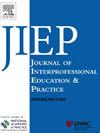Interprofessional quality improvement simulation: A virtual simulation activity for geographically distributed learners
Q3 Social Sciences
Journal of Interprofessional Education and Practice
Pub Date : 2024-12-15
DOI:10.1016/j.xjep.2024.100737
引用次数: 0
Abstract
There is a recognized need for distance learning approaches to overcome barriers to traditional QI training. Virtual learning environments present challenges for delivering interprofessional learning activities. Therefore, we drew from the knowledge of subject matter experts in education, distance learning, and team science to appropriately adapt a QI simulation for the virtual environment as part of a national QI training program. The virtual simulation integrated aspects of team development (i.e., team formation, communication, designation of team member roles, developing a team charter) into the Model for Improvement to train geographically distributed fellows. The developmental strategy of the simulation activity was guided by a learner-centered design approach such that expected outcomes and behaviors of the learning activity were identified a priori. The activity garnered good participant responsiveness from interdisciplinary postdoctoral learners (Advanced Practice Nurse Practitioners, Registered Nurses, Pharmacists, Physicians, Clinical Psychologists, Licensed Clinical Social Works, other clinical and postdoctoral healthcare trainees) such that 81 % (n = 54) of learners’ responses on a 5-point Likert scale (1 = Poor, 5 = Very Well) indicated the learning activity was effective at helping them improve their knowledge of principles and tools to enhance team performance and data utilization. This adaptation of a QI learning activity fostered QI competence among a group of nationally distributed interprofessional fellows.
Format
Flexible hybrid virtual and/or in-person activity, small group simulation activity, large group discussion, and large group debrief.
Target audience
Interprofessional QI trainees that range from beginner to intermediate levels of experience using QI methodologies.
Objectives
By the end of this activity, learners will be able to:
- 1.Apply improvement principles and tools to improve team performance
- 2.Utilize effective team-building and communication strategies for improvement work
- 3.Interpret data to guide improvement in team performance
- 1.Apply improvement principles and tools to improve team performance
- 2.Utilize effective team-building and communication strategies for improvement work
- 3.Interpret data to guide improvement in team performance
跨专业素质提升模拟:一种针对地理分布学习者的虚拟模拟活动
人们认识到需要远程学习方法来克服传统QI培训的障碍。虚拟学习环境对跨专业学习活动的交付提出了挑战。因此,我们借鉴了教育、远程学习和团队科学方面的主题专家的知识,适当地为虚拟环境调整了QI模拟,作为国家QI培训计划的一部分。虚拟模拟将团队发展的各个方面(例如,团队组建、沟通、团队成员角色的指定、开发团队章程)集成到改进模型中,以培训地理上分散的成员。模拟活动的发展策略以学习者为中心的设计方法为指导,从而先验地确定学习活动的预期结果和行为。该活动获得了跨学科博士后学习者(高级执业护士、注册护士、药剂师、医生、临床心理学家、持牌临床社会工作人员、其他临床和博士后医疗保健学员)良好的参与者反应,81% (n = 54)的学习者在5分李克特量表上的反应(1 =差;5 =非常好)表示,学习活动有效地帮助他们提高了原则和工具的知识,从而提高了团队绩效和数据利用率。这种对QI学习活动的适应培养了一群分布在全国各地的跨专业人员的QI能力。灵活的混合虚拟和/或面对面的活动,小型小组模拟活动,大型小组讨论和大型小组汇报。目标受众:从初学者到中级水平使用QI方法的跨行业QI学员。目的:在本活动结束时,学习者将能够:1。运用改进原则和工具来提高团队绩效。运用有效的团队建设和沟通策略进行改进工作。解释数据以指导团队绩效的提高。运用改进原则和工具来提高团队绩效。运用有效的团队建设和沟通策略进行改进工作。解释数据以指导团队绩效的提高
本文章由计算机程序翻译,如有差异,请以英文原文为准。
求助全文
约1分钟内获得全文
求助全文
来源期刊

Journal of Interprofessional Education and Practice
Social Sciences-Education
CiteScore
1.60
自引率
0.00%
发文量
80
期刊介绍:
Journal of Interprofessional Education & Practice, a quarterly online-only journal, provides innovative ideas for interprofessional educators and practitioners through peer-reviewed articles and reports. Each issue examines current issues and trends in interprofessional healthcare topics, offering progressive solutions to the challenges facing the profession. The Journal of Interprofessional Education & Practice (JIEP) is affiliated with University of Nebraska Medical Center and the official journal of National Academies of Practice (NAP) and supports its mission to serve the public and the health profession by advancing education, policy, practice & research.
 求助内容:
求助内容: 应助结果提醒方式:
应助结果提醒方式:


